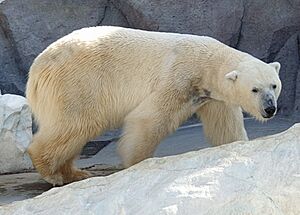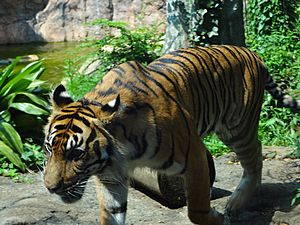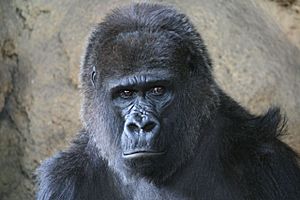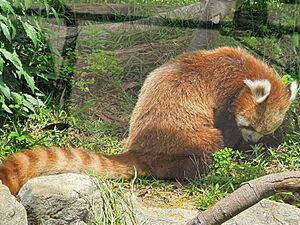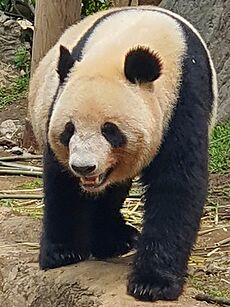Ueno Zoo facts for kids
 |
|
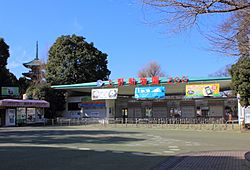
Ueno Zoo entrance gate
|
|
| Date opened | 1882 |
|---|---|
| Location | Tokyo, Japan |
| Land area | 14.3 ha (35 acres) |
| Coordinates | 35°43′03″N 139°46′17″E / 35.71750°N 139.77139°E |
| No. of animals | 2600 |
| No. of species | 464 |
| Memberships | JAZA |
| Major exhibits | giant panda, Sumatran tiger, western lowland gorilla |
The Ueno Zoo (恩賜上野動物園 (Onshi Ueno Dōbutsuen)) is a large zoo in Tokyo, Japan. It covers about 14.3 hectares (35 acres) and is managed by the Tokyo Metropolitan Government. This zoo is the oldest in Japan, first opening its doors on March 20, 1882. It is easy to get to, with several public transportation options nearby, including Ueno Station. The zoo is located inside Ueno Park, a big city park that also has museums and other fun places to visit. The zoo is usually closed on Mondays.
The Ueno Zoo Monorail used to connect the eastern and western parts of the zoo. It was the first monorail in Japan. However, it stopped running in 2019 and was permanently closed on December 27, 2023.
Contents
History of Ueno Zoo
The Ueno Zoo began as a collection of animals connected to the National Museum of Natural History. In 1881, a naturalist named Tanaka Yoshio helped turn it into a public zoo, called the Ueno Imperial Zoo. The land where the zoo stands was originally owned by the imperial family. In 1924, it was given to the city government, along with Ueno Park. This happened when Crown Prince Hirohito got married.
Ueno Zoo During World War II
During World War II, in August 1943, the leader of Tokyo ordered that many "wild and dangerous animals" at the zoo be killed. He was worried that bombs might hit the zoo, and if the animals escaped, they could cause problems in the city. The zoo staff asked if they could save the animals or move them to a safer place, but their requests were not allowed.
It was a very sad time for the zoo. Many animals, including some elephants, were killed. A special memorial service was held for the animals in September 1943. Today, a permanent memorial stands at Ueno Zoo, rebuilt in 1975, to remember the animals that were lost. The story of the elephants during this time is told in the book Faithful Elephants.
After the war, in 1949, two elephants named Hanako and Indira came to live at the zoo. Later, Hanako moved to another zoo, and Indira traveled around Japan.
Modern Changes at the Zoo
In recent years, Ueno Zoo has been working to make its animal homes more like their natural environments. Some of the older cages have been replaced with modern habitats. For example, the "Gorilla Woods" was built after some gorillas had escaped in 1999. While some animal enclosures are still older, the zoo continues to improve its facilities to give animals more space and a better life.
Animals at Ueno Zoo
The Ueno Zoo is home to more than 2,600 animals. These animals represent over 500 different kinds of species from all over the world.
Popular Animals
One of the most famous animals at Ueno Zoo is the giant panda. After the panda Ling Ling passed away in 2008, the zoo did not have a giant panda for a few years. But in February 2011, two new giant pandas arrived from China. The male panda was named Līlī, and the female panda was named Shinshin. Their names were chosen to represent playfulness and purity.
The zoo is divided into two main parts: the eastern garden and the western garden. These two sections are connected by a bridge called the Aesop Bridge, which was built in 1961.
Eastern Garden Animals
The eastern garden is where you can find many exciting animals. These include giant pandas, sika deer, Japanese squirrels, and Eurasian otters. You can also see birds like green pheasants and snowy owls. Large animals like Asian elephants, American bison, and different types of bears such as Japanese black bears and polar bears live here. Other animals include colobus monkeys, black-handed spider monkeys, Sumatran tigers, and western lowland gorillas. You might also spot California sea lions and harbor seals.
Western Garden Animals
The western garden is home to a different set of animals. Here, you can see red pandas and western grey kangaroos. There are also many birds like African penguins, Caribbean flamingos, and shoebills. Larger animals in this section include hippopotamuses, pygmy hippopotamuses, black rhinoceroses, and reticulated giraffes. You can also find interesting creatures like Aldabra giant tortoises, saltwater crocodiles, and unique lemurs such as aye-ayes and ring-tailed lemurs.
See also
- Tama Zoological Park
- Tokyo Sea Life Park
 | James B. Knighten |
 | Azellia White |
 | Willa Brown |


